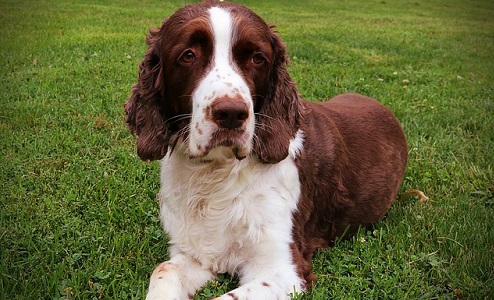These days, we’ve become acutely aware of the seriousness of peanut allergies. Regulations have become increasingly rigid, requiring clear labeling on food packaging and restaurant menus. Moreover, new brands have spawned in the marketplace, focusing on peanut free foods. Many restaurants have also begun proactively highlighting their peanut free offerings.
These changes have been welcomed as they help ensure people with peanut allergies can enjoy their food worry-free. While many of us are aware of the existence and potential seriousness of peanut allergies in people, can dogs be allergic to peanut butter as well?
At the end of the day, many dog owners may give their furry friends some peanut butter either as a tasty treat or an easy way to take medications. After all, most dogs can eat peanut butter without any issues. Unfortunately, some cannot tolerate it.
If your dog is allergic to peanut butter, you won’t know it until they have already consumed t. As a pet owner, it’s important to understand your dog actually can have allergies. Much like humans, dogs can be allergic to foods like peanut butter, insects like bees, and even other dogs. This article will help you recognize the symptoms and causes of peanut allergies in your pup, along with some treatment options and methods of prevention.
Symptoms
Symptoms of peanut allergies in dogs will vary. They may be exhibited immediately and can be quite severe. Anaphylactic shock may even occur if your dog is severely allergic to peanut butter. However, allergies may also develop over time, after ingesting multiple servings of peanut butter. Some common symptoms typically include:

- Red and itchy skin
- Excessive licking of the skin
- Agitation
- Difficulty breathing
- Bald spots
- Hot spots
One important thing to note is there are two types of peanut allergies in dogs. The first is called canine atopic dermatitis, which is another term for a skin allergy. Dogs with this type of peanut allergy are more likely to develop skin redness, become itchy, and excessively lick their skin. The other type of peanut allergy is an internal bodily reaction. If your dog is affected by peanut butter in this way, you may not notice any redness, itching, or excessive licking, but you may notice severe agitation and/or difficulty breathing.
Causes
You may be wondering, “why and how could my dog, or any dog for that matter, be allergic to peanut butter?” – after all, this is a valid question. While they do vary, there are a few common causes of peanut butter allergies. An untreated histamine response to peanut butter is another cause of an allergic reaction. Some dogs may not actually be allergic to peanuts, but they could have an immune system which is hypersensitive to one of the other ingredients in the peanut butter. One specific ingredient many canines are allergic to is Xylitol, which is found in some brands of peanut butter. Ingesting Xylitol can result in your dog’s blood pressure dropping significantly, leading to hypoglycemia.
Treatment
Now that we’ve covered some of the common symptoms and causes of peanut butter allergies in dogs, let’s discuss methods of treatment. If you suspect your dog may have had an allergic reaction to peanut butter, you should schedule an appointment with your vet. Once diagnosed, common treatments include topical creams which help with atopic dermatitis and antihistamines, which are typically reserved for internal bodily reactions commonly affecting your pet’s ability to breathe.
Anaphylactic Shock
Likely the most severe of all allergic reactions is anaphylactic shock. In addition to the symptoms previously noted, if your dog is experiencing anaphylactic shock, he may also exhibit:
- Sudden diarrhea
- Excessive drooling
- Vomiting
- Fast heart rate
- Weak pulse
If your dog is experiencing an anaphylactic event, your veterinarian will usually administer an emergency dose of adrenaline via injection. While this can be a scary situation for you as a pet owner, treatments are generally very effective and the majority of pups make a full recovery. Whether or not your dog experienced an anaphylactic event, the vet may also prescribe an allergy medication and even an EpiPen so you’re prepared in the event of another occurrence.
Recovery & Prevention
If your furry friend is promptly treated, he will generally make a full recovery with little to no negative consequences. This also applies to anaphylactic events – the key here is having a prompt reaction and immediate treatment. In terms of prevention, it comes as no surprise the most subscribed to and method of prevention is to avoid peanut butter altogether! If your pet loves peanut butter, there are a few dog-friendly peanut butter alternatives to replace their favorite snack such as almond, cashew, and sunflower butters.
Sources:
“Peanut Butter Allergies in Dogs – Symptoms, Causes, Diagnosis, Treatment, Recovery, Management, Cost.” WagWalking, 22 Sept. 2016, Accessed 2 Dec 2018. www.wagwalking.com/condition/peanut-butter-allergies.
Eckstein, Sandy. “Caring for a Dog with Food Allergies.” WebMD, Accessed 2 Dec 2018. www.pets.webmd.com/dogs/guide/caring-for-a-dog-that-has-food-allergies#1.
Burke, Anna. “What Peanut Butter Is Safe for My Dog?” American Kennel Club, 25 Oct. 2017, Accessed 2 Dec 2018.www.akc.org/expert-advice/nutrition/can-dogs-eat-peanut-butter/.




